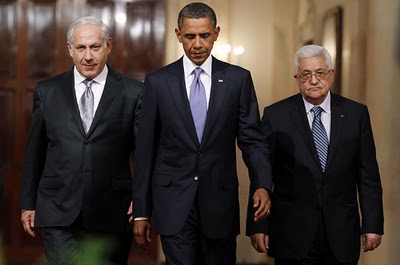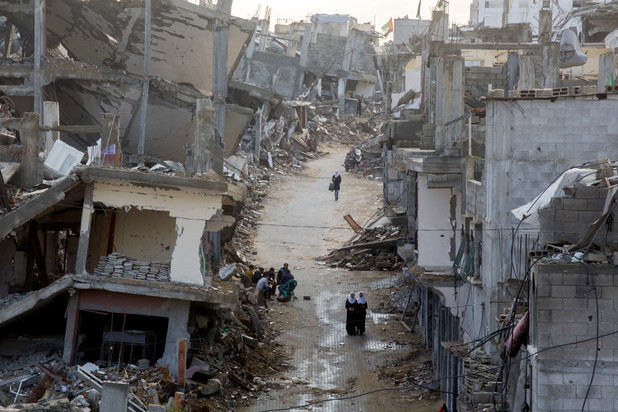Why the Palestinian Authority Can Be Sued in the US for “Terrorism” but Israel Can’t

In January, a trial began in a Manhattan federal court against the Palestinian Authority and the Palestine Liberation Organization (PLO) on accusations of orchestrating “terrorism.”
The civil suit, originally filed 11 years ago, alleges that the PA and the PLO are responsible for seven acts of “terror” carried out between 2001 and 2004 in present-day Israel, which collectively caused the deaths of 33 people and injuries to hundreds more, including many US citizens.
In order to succeed, plaintiffs have to prove that the Palestinian Authority enabled and caused the seven attacks as part of its policy. Because “Palestine” is not recognized as a state by the US government, the PA and PLO do not enjoy immunity under the Foreign Sovereign Immunities Act (FSIA), which bars lawsuits against foreign states in US courts.
However, regardless of its status under FSIA, the Obama administration could argue for the PA’s immunity if it were so inclined. As it is goes forward, the civil suit has potential to compromise the PA’s maneuvers in the International Criminal Court (ICC).
Can a jury take decisions on international politics?
The case is being brought under the Anti-Terrorism Act of 1991, which allows US citizens to sue foreign organizations for damages resulting from “international terrorism.”
There has been a spate of similar civil suits successfully brought against organizations or financial institutions. Most recently, a jury found the Arab Bank liable for material support for terrorism for providing financial services to the Palestinian political and military organization Hamas, which the US government designates as a ”foreign terrorist organization.”
However, some legal experts object to the notion of a jury of twelve US citizens presiding over matters of international politics.
“I’m not a great believer in using litigation to make public policy. I think public policy should be made publicly, through elected officials, not through 12 jurors,” attorney Eric Lewis told The Electronic Intifada. In the past, Lewis has represented The Arab Bank as well as detainees at the US prison at Guantanamo Bay, Cuba.
Lewis said that there were thin grounds for turning “a political atmosphere into proximate causation in the law.”
Attempt to block ICC moves
Indeed, the current political atmosphere makes the timing of this civil suit particularly fraught. With the Palestinian Authority’s accession to the International Criminal Court, Israel and its supporters have threatened to retaliate against the PA in the event that the ICC prosecutes Israeli war crimes, including those committed last summer during the attack on Gaza that killed more than 2,200 people.
US courts have ruled that Israeli officials responsible for killing Palestinian civilians should enjoy legal immunity. (Anne Paq / ActiveStills)
While the plaintiffs are a number of American citizens who survived the “terror” attacks or whose relatives were killed in them, the case has been propelled forward from its inception by Shurat HaDin, an Israeli lawfare organization with ties to the spy and assassination agency Mossad.
Shurat HaDin works under the motto “Bankrupting terror, one lawsuit at a time,” but it is clear that monetary awards do not motivate its countless lawsuits.
Lewis sees the current case as functioning to discredit the PA as agents of terrorism — rather than to extract damages. He states that only a very small number of people have ever collected money awarded through Anti-Terrorism Act cases.
In fact, Shurat HaDin has filed a number of complaints with the International Criminal Court against various Palestinian Authority and Hamas officials with the sole purpose of intimidating Palestinian political bodies from pursuing prosecutions of Israeli officials or soldiers.
The New York Times reports that Shurat HaDin director Nitsana Darshan-Leitner does not actually expect to see these complaints pursued by the ICC, “but hopes [they] will deter the Palestinians from pursuing parallel claims against Israelis.”
The current case against the PA may very well serve the same purpose. Jonathan Schanzer, vice president for research at the pro-Israel Foundation for Defense of Democracies, told the Investigative Project on Terrorism (a website founded by leading Islamophobe Steve Emerson) that a judgment against the Palestinian Authority “could give the United States some leverage in getting PA President Mahmoud Abbas to back off the unilateral moves.”
Many documents, little evidence
Plaintiffs have submitted an abundance of documents claiming to show a direct financial connection between the PA and Palestinian activists and fighters.
A significant portion of the evidence purporting to prove a direct relationship between the PA and the seven attacks are documents seized by Israeli occupation forces duringOperation Defensive Shield, a military assault into several occupied West Bank cities in 2002.
None of the hundreds of thousands of documents that were seized during the Israeli raid on PA headquarters in Ramallah showed an authorization of an actual attack, but they do indicate that Yasser Arafat, then leader of the PA and the PLO, signed off on the transfer of funds to what Israeli intelligence characterized as armed militias.
Israel and its vocal defenders, including Matthew Levitt of the Washington Institute for Near East Policy and anti-Palestinian activist Caroline Glick, made much of this discovery at the time. Glick depicted Arafat as a monstrous villain who not only financed terror operations, but deprived Palestinian civilians of funds sorely needed to build up their “civil society” by callously diverting money to “terrorist cells.”
However, outside committed Zionist circles there was no consensus on what the documents revealed. Human Rights Watch analyzed the documents and the PA’s role in inciting or encouraging acts of “terror” between 2000 and 2002 (the period during which all but one of the attacks referred to in the current trial took place), and found no evidence demonstrating that Arafat or any other senior PA officials played any role in planning attacks against Israeli civilians.
Nor did Human Rights Watch find that “PA officials or institutions organized or assisted in preparing or carrying out attacks against civilians systematically or as a matter of policy.”
When state terror is immune
Successfully prosecuting the case against the PA and the PLO hinges on the ability to prove that the seven acts of violence were the result of “governmental” policy. Conversely, Israeli acts of mass killing are granted immunity for the very fact that theyare state policy.
Consider the case against then-director of Israel’s General Security Service (also known as Shin Bet or Shabak), Avi Dichter, who helped the Israeli army decide to drop a one-ton bomb an on apartment building in Gaza City, killing 15 Palestinians and injuring more than 150 others in 2002.
The Center for Constitutional Rights filed a case against Dichter for orchestrating what they called targeted, extrajudicial killings. But in 2007, a US judge dismissed the lawsuit on the grounds that Dichter was operating in an official capacity.
During the appeals process, Israeli ambassador Danny Ayalon sent a letter to the court taking full responsibility for the bombing on behalf of the Israeli government while arguing for Dichter’s immunity.
Ayalon went on to criticize the lawsuit as undermining the work of foreign diplomacy: “The attempts to draw US courts into the adjudication of these cases runs counter to the ongoing Israel-US dialogue and the key diplomatic role of the US in the region.”
The Bush administration also opposed the prosecution of Dichter and, similarly, the Obama Administration opposed the prosecution of Saudi Arabia for its alleged role in supporting the hijackers involved in the 11 September 2001 attacks in the United States.
Of note, in both cases the executive branch did not argue for the immunity of Israeli or Saudi officials on the basis of the Foreign Sovereign Immunities Act, but instead cited executive branch dominion over foreign affairs and the need to maintain respectful boundaries between US law and other states’ policies.
“Foreign official immunity serves as a vital protection against such interference by private litigants,” the State Department wrote in a friend of the court brief. So though the PA is not eligible for immunity as a recognized state, its officials might still be granted protection.
While the White House could still intervene as the case winds its way through US courts, there is no precedent for a US administration intervening in legal proceedings to argue for Palestinians’ right to foreign immunity.
If one needed any more evidence that the US is not concerned with respecting Palestinian sovereignty, one can find it in US courts.


